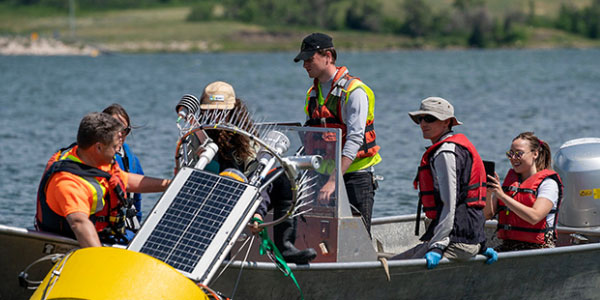Working for Our Water Future

A brief overview of University of Saskatchewan and Global Institute for Water Security research being done to strengthen Saskatchewan's water assets and help us prepare for a water-secure future.
Food-Water Nexus Education and Training (FWNET) Program
FWNET is a training program backed by a $1.65 million Graduate Training Opportunity. It aims to train over 50 highly qualified personnel (HQP), including both MSc and PhD candidates. The program has an interdisciplinary foundation to address global food-water security issues. It focuses on the interrelation and interdependency between food and water through:
- Development of precision technologies to observe plant-soil-water interactions at the root-zone level
- Nutrient & agrochemical stewardship & climate change
- The socioeconomics of production decisions and food-water policy
Water-Health CREATE
The Water-Health training program is supported by NSERC-CREATE to train graduate and postdoctoral students in key areas related to water quality and quantity, biodiversity, and human health and wellbeing. Their projects focused on:
- Freshwater ecology & environmental toxicology
- Geography and socio-hydrology
- Socio-economic & cultural drivers of water health
- National and international regulations and policies
Maternal Wellbeing Measure (MWM)
This Canada–East Africa initiative aims to create the Maternal Well-being Measure (MWM)—a groundbreaking tool designed to promote equity, empower Indigenous women and enhanced maternal wellbeing.
The MWM will enable communities, local governments, and organizations to assess maternal well-being using indicators developed in collaboration with the communities themselves. By identifying gaps and needs that impact women, girls, and their babies, this tool will guide targeted actions to improve health and well-being at both local and global levels.
Saskatchewan River Basin
The 406,000 square kilometre Saskatchewan River Basin (SaskRB) is the major water resource for the three Prairie provinces and is representative of many global water security challenges. Our institute has over 15 research sites throughout the river basin from the Rocky Mountains in Alberta through to Manitoba.
Global Water Futures (GWF)
Global Water Futures is a pan-Canadian research program that is funded in part by a $77.8-million grant from the Canada First Research Excellence Fund. The overarching goal of the program is to deliver risk management solutions - informed by leading-edge water science and supported by innovative decision-making tools - to manage water futures in Canada and other cold regions where global warming is changing landscapes, ecosystems, and the water environment.
Global Water Futures (GWF) aims to position Canada as a global leader in water science for cold regions and will address the strategic needs of the Canadian economy in adapting to change and managing risks of uncertain water futures and extreme events. End-user needs will be our beacon and will drive strategy and shape our science.
Changing Cold Regions Network (CCRN)
The Changing Cold Regions Network (CCRN) is a collaborative research network bringing together the unique expertise of a team of over 50 university and government scientists, including 36 Canadian scientists representing four government agencies and eight universities, as well as 15 international scientists. The network is funded for five years (2013-18) through the Climate Change and Atmospheric Research Initiative of NSERC.
International Network for Alpine Research Catchment Hydrology (INARCH)
Led by John Pomeroy, GIWS member, Canada Research Chair in Water Resources and Climate Change and director of the U of S Centre for Hydrology, the International Network for Alpine Research Catchment Hydrology (INARCH) is a project of the Global Energy and Water Exchanges (GEWEX). The project's goal is to better understand alpine cold regions hydrological processes, improve their prediction and find consistent measurement strategies.
Valuing Water Global Assessment
The sustainability nonprofit Ceres is joining forces with the Global Institute for Water Security to draw attention to the strong linkage between unsustainable corporate practices and major threats to our global water water supplies. GIWS will conduct science-based research and analysis on industry practices in water-intensive sectors that have led to increased water scarcity and pollution, and threatened ecosystems and accessibility in communities around the globe. The global food agribusiness sector - which uses more than 70% of the world's fresh water to grow crops, feed livestock and process ingredients - will be among those industries analyzed.
